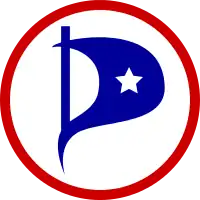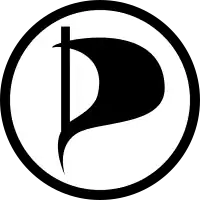United States Pirate Party
The United States Pirate Party[1] (USPP) is an American political party founded in 2006 by Brent Allison and Alex English.[2] The party's platform is aligned with the global Pirate movement, and supports reform of copyright laws to reflect open source and free culture values, government transparency, protection of privacy and civil liberties. The United States Pirate Party also advocates for evidence-based policy, egalitarianism, meritocracy and the hacker ethic as well as the rolling back of corporate personhood and corporate welfare. The USPP has also made a priority to advocate for changes in the copyright laws and removal of patents. It is the belief of the party that these restrictions greatly hinder the sharing and expansion of knowledge and resources.[3]
United States Pirate Party | |
|---|---|
 | |
| Chairperson | Meg Cochran (WI) |
| Founded | June 6, 2006 |
| Ideology | Pirate politics Techno-progressivism Freedom of information Civil libertarianism Open government Direct democracy |
| International affiliation | Pirate Parties International |
| Colors | Purple, Red, Blue |
| Seats in the Senate | 0 / 100
|
| Seats in the House | 0 / 435
|
| Governorships | 0 / 50
|
| State Upper Houses | 0 / 1,921
|
| State Lower Houses | 0 / 5,410
|
| Website | |
| Official website | |
The party's national organization has existed in multiple incarnations since its 2006 founding. Its most recent is the Pirate National Committee (PNC), formed in 2012 as a coalition of state parties. The PNC officially recognizes Pirate parties from 8 states,[1] and tracks and assists in the growth of more state parties throughout the United States. The board of the USPP is the board of the PNC. The current Chair of the Pirate National Committee is Lindsay-Anne Gorski (née Brunner).[4]
History
The Pirate Party was founded in June 2006 by University of Georgia graduate student Brent Allison in response to the success of the Swedish Piratpartiet. Its platform was focused primarily on copyright reform and freedom from Internet censorship. The party first attempted to register in Utah during the 2007/2008 election cycle and failed to collect the required number of Statements of Support.[5][6] In 2011, the Massachusetts Pirate Party became the first legally recognized Pirate Party in the US.[7] By 2011, the Pirate Party reported over 3000 members nationwide.[8]
In 2012, a coalition of state Pirate parties formed the Pirate National Committee (PNC).[9] By July of that year, the PNC drafted and adopted a new constitution, which outlined a broader ideology inspired by Rickard Falkvinge's Pirate Wheel.[10]
Name
The Pirate Party defends their oft-criticized name[11] in the preamble of the PNC's constitution:[3]
For our values, we have been derided as "pirates". For our hope that every person may be free to access all of human knowledge, we have been called "pirates". For our belief that one need not ask permission to participate in governance, industry, culture, and other aspects of society, we have been called "pirates". For our insistence that citizens should not be surveilled and distrusted as if they are criminals, we have been called "pirates". For our rejection of authority and profit-seeking when it does not serve the common good of all people, we have been called "pirates". We reclaim this label of "pirate" and abjure its derogatory, incendiary implication. We are Pirates. We stand for the liberty, equality, and solidarity of all human beings, and against all threats they may face.
Ideology
Factions within the Pirate Party include left-libertarians, classical liberals, anarchists, progressives, and radical centrists. Many Pirates explicitly decline to identify with any particular political ideology or philosophy. They are driven to "do what works" rather than being driven by a particular ideology.[12]
The Pirate Party's platform originally centered on issues of copyright. "Like its international counterparts, the USPP's main practical concerns are digital intellectual property and privacy laws—specifically, the abolition of a 1998 digital U.S. copyright law, the reduction of copyrights to 14 years (from 95 years after publication, or 70 years after the author's death), and the expiration of patents that don't result in significant progress within four years (as opposed to 20 years)."[8]
In 2012, the party began an expansion of its platform, inspired by the Pirate Wheel.[10] The party emphasizes the cultural values of the hacker ethic, open source and free culture, strong protection of individual civil liberties, government transparency, participatory governance, and evidence-based policy. It solidified these tenets by publishing a series of essays in January 2012 where it voiced its values using quotations from historical figures, including Benjamin Franklin ("They who can give up essential liberty to obtain a little temporary safety, deserve neither liberty nor safety"), Mark Twain ("Only one thing is impossible for God: to find any sense in any copyright law on the planet"), Albert Camus ("The only way to deal with an un-free world is to become so absolutely free that your very existence is an act of rebellion") and Thomas Jefferson ("Timid men prefer the calm of despotism to the tempestuous sea of liberty.") in order to highlight the timelessness, urgency, and consensual agreement on its positions related to free culture.[13]
PNC
Captain
Before 2012, the chairperson of the party was elected every July by a membership vote, as established in the party constitution.[14] After the 2012 formation of the PNC, the role's name was changed to Captain.[3]
| Name | From | To |
|---|---|---|
| Brent Allison | June 6, 2006 | June 9, 2006 |
| Joshua Cowles | June 9, 2006 | May 2007 |
| Andrew Norton | May 2007 | September 2008a |
| Glenn Kerbein | September 2008a | July 2009 |
| Ryan Martin | July 2009 | December 29, 2009b |
| Bradley Hall b | December 29, 2009 | January 28, 2010 |
| Brittany Phelps c | January 28, 2010 | July 15, 2011 |
| Bradley Hall | July 15, 2011 | April, 2012 |
| Travis McCrea | April, 2012 | November 14, 2012 |
| Lindsay-Anne Brunner | November 14, 2012 | January 28, 2015 |
| Andrew Norton d | January 28, 2015 | March 1, 2016 |
| Joseph Klein | March 1, 2016 | May 15, 2017 |
| Lindsay-Anne Gorski | May 15, 2017 | January 28, 2019 |
| Meg Cochran | January 28, 2019 | incumbent |
^a Norton stepped down mid-term to head up Pirate Parties International. Kerbein, as Operations Officer, stepped into the position for the rest of the term.
^b Martin was removed via a Vote of No Confidence on December 29, 2009. Hall was selected as Administrator pro-tempore for a 30-day period until elections could be held.[15]
^c See Wikinews interview with Peter Coti.
^d Norton resigned in order to have more time to devote to other interests.[16]
Officers
- Chair – Meg Cochran
- Vice Chair – Joseph Onoroski
- Secretary – Joseph Klein
State parties
| State[17] | Founded | PNC Member[9] | Notes | |
|---|---|---|---|---|
| Arizona | No | |||
| California | Yes | |||
| Florida | Yes | |||
| Georgia | Yes | |||
| Hawaii | No | |||
| Illinois | No | |||
| Indiana | No | |||
| Kansas | No | |||
| Maryland | No | Working towards PNC membership. | ||
| Massachusetts | Yes | |||
| Michigan | Observer | |||
| Minnesota | 2014 | No | ||
| Missouri | Observer | |||
| New Hampshire | No | |||
| New York | August 25, 2010 | Yes | ||
| Ohio | October 30, 2018 | No | ||
| Oklahoma | January 18, 2010 | Observer | The Pirate Party of Oklahoma was formed on January 18, 2010 with the signing of its constitution,[18] and the filing of a motion of intent to form a political party with the Oklahoma Election Board. The founding chairman was Marcus Kessler. The party was named an official state chapter of the United States Pirate Party on January 19, 2010.[19] The party mounted a signature drive to try to gain access to the Oklahoma ballot, but was unsuccessful. The party did not run any candidates for office in 2010. | |
| Oregon | November 9, 2010 | Yes | The Oregon Pirate Party was given official state party status on November 9, 2010. | |
| South Carolina | No | |||
| Texas | No | |||
| Utah | No | |||
| Washington | Yes | |||
| Wisconsin | July 4, 2012 | Yes | Registered with the Wisconsin Government Accountability Board. |
See also
- Copyright in the United States
- List of United States political parties
- Patent pirate
References
- "About". United States Pirate Party. Archived from the original on 21 October 2015. Retrieved 23 September 2015.
- Milchman, Eli "The Pirates Hold a Party", Wired Magazine, 2006-06-20. Retrieved on 2009-02-20,
- "Platform | United States Pirate Party".
- "Leadership | United States Pirate Party".
- Cheng, Jacqui "US Pirate Party seeks legitimacy, starts in Utah", Ars Technica, 2007-08-09. Retrieved on 2009-02-20.
- Triplett, William "Pirate party forms in Utah" Variety, 2007-08-11. Retrieved on 2009-03-19.
- "Massachusetts voters can now register as 'Pirates'". 2011-03-07. Retrieved 29 January 2016.
- Downie, James (2011-01-24) Avast Network, The New Republic
- "Pirate National Committee (PNC) - United States Pirate Party". Archived from the original on April 4, 2013. Retrieved July 21, 2013.
- Falkvinge, Rick "The Pirate Wheel", Falkvinge on Infopolicy. Retrieved on 2012-08-19.
- "Lessig Questions Pirate Party's Existence - TorrentFreak". TorrentFreak. 2008-03-08. Retrieved 29 January 2016.
- "FAQ". US Pirates. Piratenkleider. Archived from the original on October 28, 2016. Retrieved October 21, 2016.
- Prinzing, Marlis (2012). "The Pirate Party – A new star on the horizon of media accountability or a blended, self-serving movement?". Studies in Communications Sciences. 12 (1): 41–48. doi:10.1016/j.scoms.2012.06.009.
- "Title 2", US Pirate Party Constitution
- "Minutes of Meeting", 29 December 2009
- Andrew Norton Resigns as USPP Chair Archived 2016-04-05 at the Wayback Machine, 08 February 2016
- "United States Pirate Party". Archived from the original on July 2, 2013. Retrieved July 21, 2013.
- "Constitution of the Pirate Party of Oklahoma" Archived 2011-07-23 at the Wayback Machine 2010-01-18. Retrieved on 2010-08-14.
- "Official Minutes of Meeting" 2010-01-19. Retrieved on 2010-08-14. Archived June 18, 2010, at the Wayback Machine

.svg.png.webp)